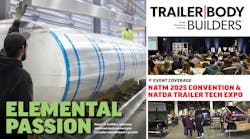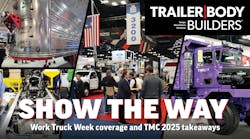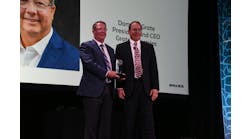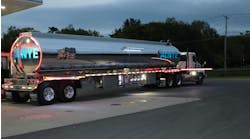Latest from What’s in Print
Historic tariffs and major trade agreements are poised to disrupt commercial vehicle manufacturing in the U.S.
Ana Meuwissen, SVP of government affairs for the Motor & Equipment Manufacturers Association, outlined the rising key issues and officials at MEMA’s Heavy-Duty Aftermarket Dialogue conference. The topmost issues that Meuwissen outlined were trade and tariffs, as Trump’s possible tariff scenarios and their effects are a major concern for MEMA’s membership.
“This is the number one issue that we in the MEMA Government Affairs Office have been hearing about from member companies across the whole span of the industry,” Meuwissen said.
The latest trade agreement between North American countries also faces major revisions in mid-2026, and MEMA is hard at work in facilitating negotiations with industry stakeholders.
Potential tariff scenarios
Congress is the nation’s main tariff authority, but the president has some power to enact tariffs. The exact limits of the president’s tariff authority are unclear, but Trump nevertheless has been vocal in his desire to impose historic tariffs on U.S. trade partners, with a number of key initiatives announced, paused, and modified in the weeks after this presentation in late January.
The president’s tariff authority could come from several laws: Section 232 of the Trade Expansion Act of 1962; Section 122, 201, and 301 of the Trade Act of 1974; Section 338 of the Tariff Act of 1930; Section 338 of the Tariff Act of 1930; and the International Emergency Economic Power Act of 1977, to name a few. Some of the tariff statutes require fixed maximum severities, such as a 15% limit or 150-day duration.
“Trump actually threatened to impose tariffs on Mexico in 2019 under IEEPA,” Meuwissen said. “But this threat was subsequently removed after bilateral negotiations between the two countries.”
Trump’s treasury secretary, Scott Bessent, shared his attitude toward tariffs during his Senate hearing. When testifying before the Senate, Bessent outlined tariffs as a methodology for three potential outcomes:
- A means to fix unfair trade practices,
- A revenue raiser for the United States, and
- As a negotiating tactic for other non-tariff issues
“I think that gives us some insight into the thinking of the president’s senior advisors coming in,” Meuwissen said.
Trade with Mexico, Canada
The United States-Mexico-Canada Agreement is another of MEMA’s top priorities. The trade deal has major influence on the U.S. economy broadly and the automotive industry specifically.
USMCA is a renegotiation of the North American Free Trade Agreement under Trump’s first term. The renegotiation brought significant changes for the automotive and commercial vehicle sectors.
“This is the most stringent automotive and commercial vehicle agreement that we have on the books in the United States,” Meuwissen said. “We basically had a complete rewrite of our chapter of the agreement, with brand-new rules and requirements being put in that impact the sector every day.”
The agreement entered force on July 2020 and has a 16-year timeline. Different vehicle classes covered by the agreement have multi-year phase-in periods. Passenger car and light-duty vehicles had a three-year phase-in period, which ended in 2023. The phase-in period for commercial vehicles is seven years and concludes in 2027.
Another change for the agreement is a review mechanism. Review for USMCA is scheduled for July 2026, where the three countries will discuss how the agreement is working and make changes. But the U.S. has never experienced a trade agreement review process like this, so the outcome of the review is uncertain.
“Honestly, we don’t know how the reviews can be managed,” Meuwissen said. “We’ve never done one like this before; there’s no prototype for this type of review.”
Some terms that the countries might renegotiate include restricting Chinese investment in Mexico, stricter regional value content requirements, and increased duty rates to compel compliance.
MEMA has a USMCA working group, started in 2024, and is meeting with officials to facilitate negotiations.
“We want to make sure that there are not dramatic additional changes to the agreement while the industry is still working through that phase-in period,” Meuwissen said.
Jeremy Wolfe | Editor
Editor Jeremy Wolfe joined the FleetOwner team in February 2024. He graduated from the University of Wisconsin-Stevens Point with majors in English and Philosophy. He previously served as Editor for Endeavor Business Media's Water Group publications.









